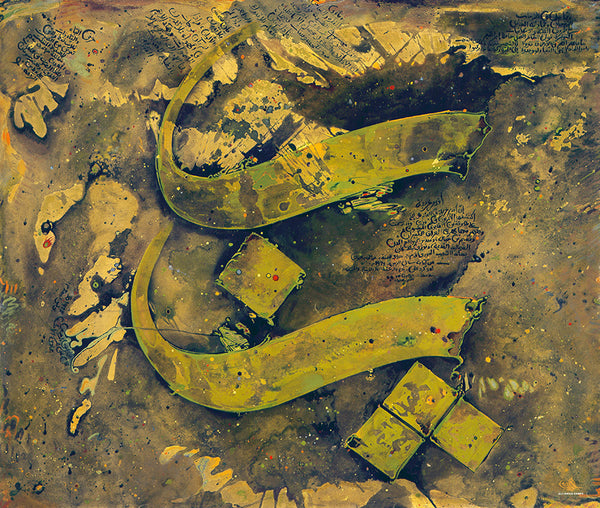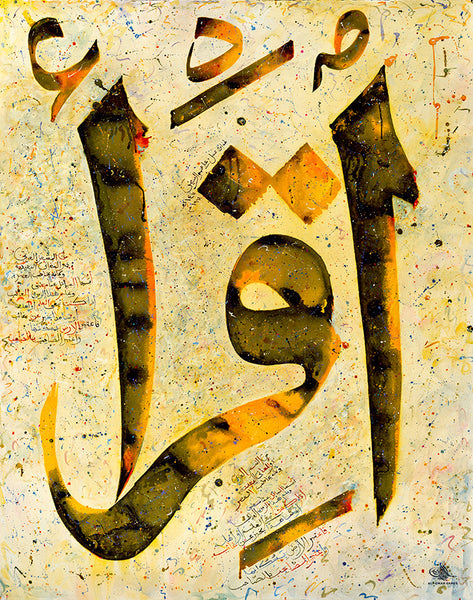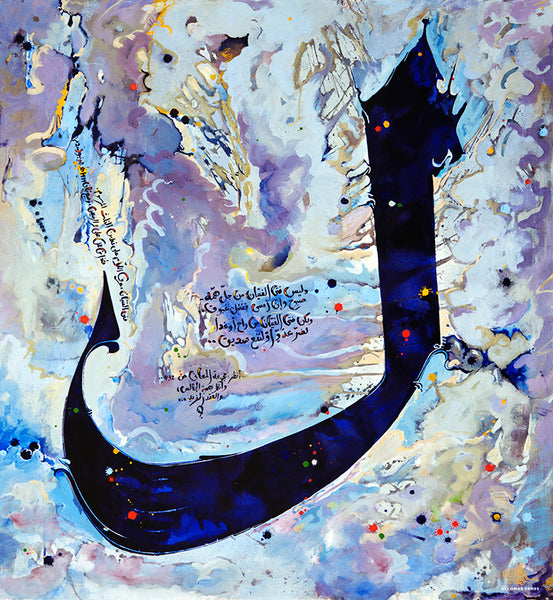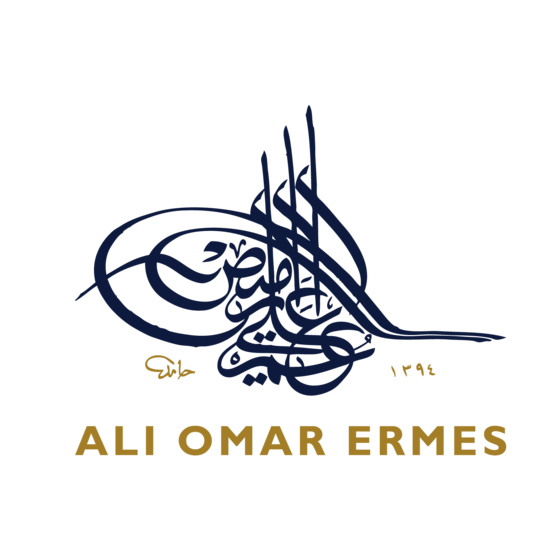At Taa: Al 'Aqd Al Farid's Eloquence Captured in Art

Al 'Aqd Al Farid's Eloquence Captured in Art: An Exploration of Communication's Four Paths
This 100cm x 80cm acrylic and ink on paper painting by Ali Omar Ermes pays tribute to the renowned poet Al 'Aqd Al Farid, exploring the four principle paths that eloquence can take as outlined by the poet himself - through assertion, inference, writing, and gesture. Currently housed in the Mobil Oil Collection, this thought-provoking artwork serves as a reminder of the many ways that eloquence can be wielded to great effect.
Like Al Farid, poets such as Rumi and Shakespeare have demonstrated the transformative power of eloquence. Through strong declarations, logical inferences, beautiful prose, and expressive body language, we can persuade, inspire, and move others. Rumi's poem "The Guest House," for example, uses assertive language to encourage readers to embrace all experiences, even the difficult ones, with grace and hospitality.
Ermes' painting captures the essence of Al Farid's message, reminding us of the importance of effective communication in all its forms. Whether through powerful assertions, subtle suggestions, written word, or expressive gestures, the ability to communicate effectively is a valuable skill that can enrich our lives and the lives of those around us. "Al 'Aqd Al Farid's Eloquence Captured in Art: An Exploration of Communication's Four Paths" celebrates the enduring legacy of the poet and the power of eloquence.
Leave a comment
Also in ARTWORKS IN INSTITUTIONS & CORPORATIONS

BP: Treasures of the Earth - A Poetic Reflection on Environmental Responsibility
Nestled within the brushstrokes of this breathtaking artwork lies a powerful message about our planet and the role we play in preserving its beauty. Ali Omar Ermes has masterfully captured the essence of environmental responsibility, showcasing the natural wonders of our world as gifts from a higher power. This 150cm x 120cm masterpiece, painted with acrylic on paper in 2002, is a true work of art, now housed in the prestigious British Petroleum collection. Through the power of poetry and art, Ermes has created a reminder of the beauty and fragility of our world and the importance of preserving it for future generations.

Iqraa: Read! The Message of Sala'a ibn Amr on Building a Just Society through Consultation and Dialogue
In Ali Omar Ermes' painting, 'Iqraa: Read!,' the inscription from a poem by Sala'a ibn Amr comments on the essential requirements for building a sound society. The poem likens the building of an equitable order to the construction of a house, emphasizing the importance of strong foundations and the use of the right materials. It also highlights the crucial role that consultation and dialogue play in fostering a healthy and harmonious society, warning against the dangers of allowing evil forces to gain dominance. Ermes' painting serves as a reminder of the crucial role that consultation, dialogue, and strong foundations play in building a healthy and harmonious society. By heeding the wisdom of Sala'a ibn Amr and working towards these goals, we can all contribute to the creation of a more equitable and just world.

Fetal Fityan: The Dignity of Purpose - Ali Omar Ermes' Exploration of Ethics and Social Justice through the Letter Lamm
In Ali Omar Ermes' painting, the letter Lamm is depicted as solid and dominant against a backdrop of various challenges and conditions. The painting is inspired by a poem from the reference source 'Bahjat Al Majalis' by Ebni Abdel Birr Al Qurtobi, a renowned jurisprudent and literature scientist from the 10th century. The poem speaks of the qualities of a true dignified individual, stating that they are not concerned with satisfying their own whims and desires, but rather are constantly striving to be of benefit to humanity. Ermes' artwork serves as a reminder of the importance of upholding one's values and principles, even in the face of challenges and difficulties. By striving to be of benefit to others and standing up for what is right, we can embody the qualities of a true dignified individual as described in the poems of Al Qurtobi's 'Bahjat Al Majalis,' a timeless collection that serves as a valuable source of wisdom and guidance.

